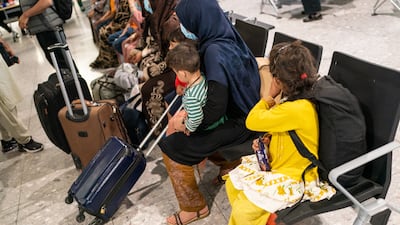Afghan evacuee families in the UK are declaring themselves homeless in a bid to expedite a move into permanent homes as frustrations grow at being kept too long in bridging hotels, a local government body has revealed.
London Councils, which represents the UK capital’s 32 boroughs, said it had received more than 200 homelessness applications from recently arrived Afghan families.
Many who came to the UK on the Afghan Relocations and Assistance Policy (Arap) have been living in hotels for weeks, with no imminent prospect of being found a permanent home as authorities process their applications and find suitable accommodation.
Dozens have chosen to declare themselves homeless in the hope that, under alternative support schemes, they can find a swifter solution. Others are concerned they will be sent to parts of the UK where they do not wish to settle.
“This shows how challenging it is for families to live in bridging hotels for long periods of time, when what they really want to do is move to settled accommodation, start to rebuild their lives and heal from the huge trauma they have experienced,” Darren Rodwell, deputy chairman of London Councils, told The National.
Mr Rodwell said most of the bridging hotels were in central London and not ideal for family life long term.
“These areas do not have enough capacity in key services such as GP surgeries and schools for the number of families now living there," he said. "Families are also living across separate rooms, as city centre hotels do not have large rooms or suites suitable for larger families, which creates care and safeguarding issues.”
London Councils is urging people who are eligible for Arap to remain in the hotels “despite the challenges they face". Declaring themselves homeless does not mean families have to vacate their hotels, but they would lose Home Office support.
Britain has flown 17,000 people from Afghanistan to safety since the beginning of April. Half of those came under the Arap or Afghan Citizens Resettlement schemes, which provides refugees with housing and financial assistance in the UK.
But two months after arriving about 7,000 refugees remain in hotel rooms and some council leaders are planning to house those involved in the Kabul evacuation in hotels for up to a year, The Guardian reported.
Many of the Afghan refugees whom The National has spoken to have complained about a lack of communication and the slow pace of permanent resettlement, while others have expressed understanding at the enormous task facing the British government.
“We know the government is very busy dealing with thousands of people, they have a lot to deal with,” Khalil Hakimi said. A former security manager with the UK’s Foreign Commonwealth Office in Afghanistan, Mr Hakimi arrived with his wife and children two months ago and has been in a hotel in London since. He said only a few families had left the hotel and been permanently housed and that neither he nor his case manager had any idea when it would be his turn.

“Nobody knows, we could get a call today, tomorrow, next week,” he said. “But we are happier here than in Kabul airport. The hotel is nice, the food is OK and the people are nice. We are happy to be here.”
The Home Office Afghan Citizens Resettlement Policy says that families can be placed anywhere in the UK and some refugees are concerned that they will eventually be housed in a location far from friends and family they have in London.
London Councils said that of the 204 applications received, 89 per cent were from families that include British citizens who are not eligible for the support of the schemes “despite having been in exactly the same horrific situation as Afghan citizen families".
“We’re hopeful that now the government is aware of the significant numbers of Afghan arrivals who are British nationals, they will close this loophole and give these families the support they so clearly need,” Mr Rodwell said.
London Councils said there was “a lot of confusion” about whether the government funding and support allocated for Afghan refugees extends to Afghan evacuees who hold British citizenship. While all recent evacuees have been given immediate support, the city's boroughs are unsure if they can help them in the medium and long term.
For Afghan-British citizens, the situation is also unclear and Mr Rodwell urged greater clarity from the government.
“Councils are unable to give British national families certainty over this issue, which in London means that a significant number of families could become homeless and end up living in temporary accommodation, without access to additional funding for housing," he said. "This would also intensify the pressure on our under-resourced social housing sector.”
About 165,000 people in London are living in temporary accommodation organised by their borough amid a citywide housing crisis.


